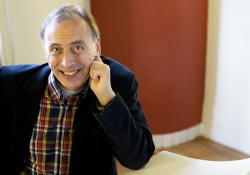Meet Dr Paul Giesen and Radboud University’s Institute for Quality of Health Care in the Netherlands

Sylvia Kohlmann
Meet Dr Paul Giesen, a general practitioner (GP) and senior research lead at Radboud University’s Institute for Quality of Health Care in the Netherlands. It does not take long for Dr Giesen to start talking about how much he loves his work as a GP.
“I like to work closely with my patients and their families – to share their moments of joy, but also their daily struggles and see how this all shapes their health behaviours,” he says. “From this angle, I also have a clear oversight of the challenges and opportunities facing my community at large and can advocate not only for individuals, but also for the community. I love working with the nurses and social workers who are part of my team. All of this makes my work so beautiful.”
This motivation and enthusiasm is supported in the Netherlands by high government commitment to primary care, complemented by high professional involvement, and an extensive range of comprehensive primary care national guidelines to help primary care teams address the growing complexities they face in their communities. Enthusiasm has not always been evident, however, particularly for care after normal working hours and on weekends.
Previously, GPs in the Netherlands had been organized in groups of 10–15 to address patient needs after hours. The groups shared responsibilities during evenings and on weekends, caring for each other’s patients. GPs found it difficult to manage the patient load when organized in this way and on this scale: they had limited clinical support and poor financial, non-financial and personal support, saw increasing numbers of patients bypassing primary care services for emergency departments, and experienced exhaustion from busy day-time hours.
Dr Giesen and a team of colleagues, concerned about the consequences this had on people’s access to 24-hour primary care and the frustrations it created for GPs, decided it was time to rethink the ways in which GPs delivered care.
The group proposed organizing GPs into larger cooperatives that would share responsibility for patients after hours. The cooperatives now include from 50 to 400 GPs and cover populations of up to half a million. On this scale, cooperatives can be supported by diagnostics like X-ray and laboratory services, special medical and non-medical equipment (including cars and trained drivers), triage nurses, a sophisticated telephone triage system and a range of information and communication technologies that, among other things, allow the cooperatives to share patient information with hospital specialists.
As satisfaction among GPs and patients has been high with this new model, Dr Giesen and his research team at Radboud University have begun to document how services are not only increasing patient and GP satisfaction, but are also improving the quality and safety of primary care.
The cooperatives matured have also started moving closer to, and in some cases directly next to, emergency departments – today, approximately 60% are co-located with emergency departments, allowing GP cooperatives to demonstrate value by catching self-referral patients who present at the departments.
Key factors in the cooperatives’ success, Dr Giesen says, are increased compensation for primary care nurses and other personnel, on-site and continuous training opportunities for GPs and nurses, close monitoring of the quality of care in terms of time, patient experiences and reasons for visits, and financial incentives that stimulate interprofessional and team-based care. To sustain the resulting increase in demand for primary care services, the cooperatives have been helped by expansion of nurses’ scope of practice to manage some degrees of acuity. Close collaboration between the government and professional associations, including those for GPs and nurses, has also been important.
Dr Giesen believes that thanks to this initiative, there is now increased recognition of the role of primary care by hospitals, specialists and policy-makers.
“By seizing an active and collaborative role in transforming primary health care services to better serve after-hours needs in the Netherlands and documenting their achievements, GPs have increased their own credibility among policy-makers,” he says.
Dr Giesen’s research team and a team from Arhus University established the European Research Network for Out-of-Hours primary health care (EuroOOHnet) in 2009 to establish a platform for identifying best practices and priority research areas across Europe.
Dr Giesen is a GP with the GP cooperative in Nijmegen, “CHN, Cooperative Huisartsendienst Nijmegen".



